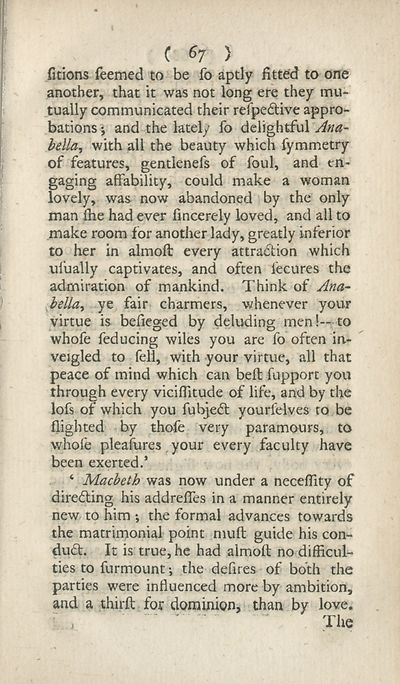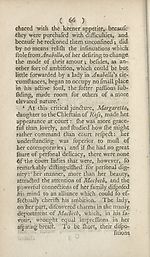Download files
Complete book:
Individual page:
Thumbnail gallery: Grid view | List view

C 67 }
fitions feemed to be fo aptly fitted to one
another, that it was not long ere they mu¬
tually communicated their refpe&ive appro¬
bations-, and the lately fo delightful Ana-
bella, with all the beauty which fymmetry
of features, gentlenefs of foul, and en¬
gaging affability, could make a woman
lovely, was now abandoned by the only
man fhe had ever fincerely loved, and all to
make room for another lady, greatly inferior
to her in almoft every attraction which
ufually captivates, and often fecures the
admiration of mankind. Think of Ana-
bella^ ye fair charmers, whenever your
virtue is befieged by deluding men 1— to
whofe feducing wiles you are fo often in¬
veigled to fell, with your virtue, all that
peace of mind which can beft fupport you
through every viciflitude of life, and by the
lofs of which you fubjedt yourfelves to be
flighted by thofe very paramours, to
whofe pleafures your every faculty have
been exerted.’
‘ Macbeth was now under a neceflity of
directing his addreffes in a manner entirely
new to him ; the formal advances towards
the matrimonial point muft guide his con¬
duct. It is true, he had almoft no difficul¬
ties to furmount the defires of both the
parties were influenced more by ambition,
and a thirft for dominion, than by love.
fitions feemed to be fo aptly fitted to one
another, that it was not long ere they mu¬
tually communicated their refpe&ive appro¬
bations-, and the lately fo delightful Ana-
bella, with all the beauty which fymmetry
of features, gentlenefs of foul, and en¬
gaging affability, could make a woman
lovely, was now abandoned by the only
man fhe had ever fincerely loved, and all to
make room for another lady, greatly inferior
to her in almoft every attraction which
ufually captivates, and often fecures the
admiration of mankind. Think of Ana-
bella^ ye fair charmers, whenever your
virtue is befieged by deluding men 1— to
whofe feducing wiles you are fo often in¬
veigled to fell, with your virtue, all that
peace of mind which can beft fupport you
through every viciflitude of life, and by the
lofs of which you fubjedt yourfelves to be
flighted by thofe very paramours, to
whofe pleafures your every faculty have
been exerted.’
‘ Macbeth was now under a neceflity of
directing his addreffes in a manner entirely
new to him ; the formal advances towards
the matrimonial point muft guide his con¬
duct. It is true, he had almoft no difficul¬
ties to furmount the defires of both the
parties were influenced more by ambition,
and a thirft for dominion, than by love.
Set display mode to:
![]() Universal Viewer |
Universal Viewer | ![]() Mirador |
Large image | Transcription
Mirador |
Large image | Transcription
| Antiquarian books of Scotland > Languages & literature > Key to the drama > (89) |
|---|
| Permanent URL | https://digital.nls.uk/122386784 |
|---|
| Description | Thousands of printed books from the Antiquarian Books of Scotland collection which dates from 1641 to the 1980s. The collection consists of 14,800 books which were published in Scotland or have a Scottish connection, e.g. through the author, printer or owner. Subjects covered include sport, education, diseases, adventure, occupations, Jacobites, politics and religion. Among the 29 languages represented are English, Gaelic, Italian, French, Russian and Swedish. |
|---|

